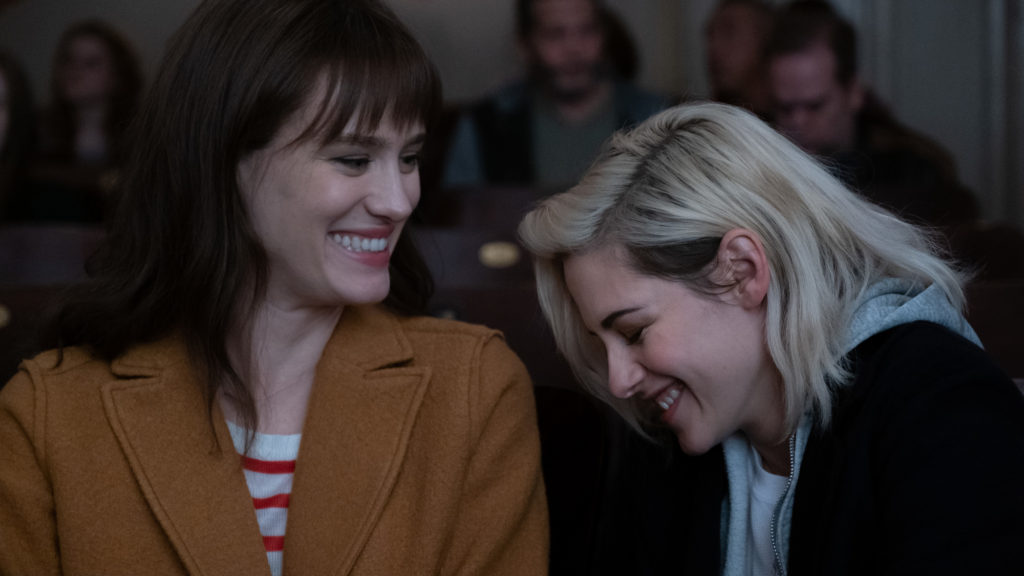The Christmas rom-com is a subgenre that’s blended together long enough. With seemingly never-ending Hallmark-centric lists like Christmas movie posters with white heterosexual couples wearing red and green, it’s a mindless constant annually in the film landscape that rarely makes a breakout into memorability.
With rare exceptions, like holiday zombie musical Anna and the Apocalypse, or Michael Dougherty’s Krampus, festive film is far from the golden days of the classics. The closest to memorability we’ve had as of late have been these genre-bender festive horror films, and the rest struggled to catch up. The closest thing we’ve truly had to a major lesbian Christmas movie is Carol, whose festive trappings around a love story qualify it, but it’s hard to argue that the ravishing drama is about Christmas. Happiest Season may often be written off for being the first on its scale, but it comes closer to heartwarming 21st century classic holiday film than anything.
FemmeFilmFest20 Review: But I’m a Cheerleader (Jamie Babbit)
Harper (Mackenzie Davis) and Abby (Kristen Stewart) are referred to as “the perfect couple” early on. Abby hasn’t found the holidays enjoyable since her parents died, but she badly wants to understand what about the lights makes Harper smile that way. The couple decides to spend this Christmas with Harper’s parents, but there’s two catches: Abby wants to propose on Christmas morning, and Harper isn’t out to her parents. The couple finds what this holiday means to them, but more importantly, which family they are really doing this for.
What follows is the kind of clumsy family relationship comedy that comes with all kinds of people under one roof. Mary Steenburgen provides that familiar awkwardness of family dinner as you get older as the family’s matriarch, and Mary Holland and Alison Brie are hilarious as Harper’s sisters, the three of them all wildly different. This massive family only grows with friends and neighbors around, and it’s a madhouse of characters to try and hide from, each with secrets of their own..
One side character in particular gives Happiest Season its developed heart. Aubrey Plaza’s Riley is Harper’s high-school girlfriend, back in town for Christmas. She and Abby grow close, bonding over how both of them had to keep their relationship with Harper a secret, and Abby soon grows fearful this will blow up for her the way the small-town rumor mill did for Riley. Her knowing smile and welcoming talks with Abby show that queer solidarity found when outnumbered like this, and it is through the camaraderie of its LGBT characters that Happiest Season finds its footing as gay cinema instead of a human interest story for a heterosexual audience.
Rewind: 1993 in Film – The Nightmare Before Christmas
Riley shines because through many parts of this film, Harper’s actions make her a bit dislikable. Sure, she isn’t ready, but the game she asks Abby to play here is often unfair, and it is that she must atone for along the way. Riley is a foil for that, having suffered the small town homophobia without making others take the fall for her, and staying kind to the two of them, even when its surprising there’s no bitterness.
What is worth discussing is why the first major gay Christmas movie, or the first gay anything, is always white. Someday we’ll be in a world where the industry doesn’t have this ladder of privilege, and that day is long overdue. For now, at least the film comes from it’s director, Clea Duvall’s heart, an authentic experience of what her story and family had been like. A staple of the lighter side of new queer cinema since the But I’m a Cheerleader days, Duvall finds her place in comfort fare with heart. The day we get a holiday film like this that’s less focused on white Christnormative society will be a day of reckoning for a Holywood that only takes things one step at a time.
What Happiest Season feels like is curling up in a warm sweater on a cold day. It knows when to be light, and when it can get away with instilling its emotional weight, and it has enough substance that it’s a beautifully charming end result. Mainstream lesbian media made by lesbians and starring women who love women is a beautiful thing, and it’s great to see outside the indie circuit a Hollywood budget embrace of LGBTQ stories. Kristen Stewart is a star here and the heart of a film, a story that isn’t about Harper hiding her love as Abby initially thinks, but about her hiding herself until she knows that this part of her life can stay too.

